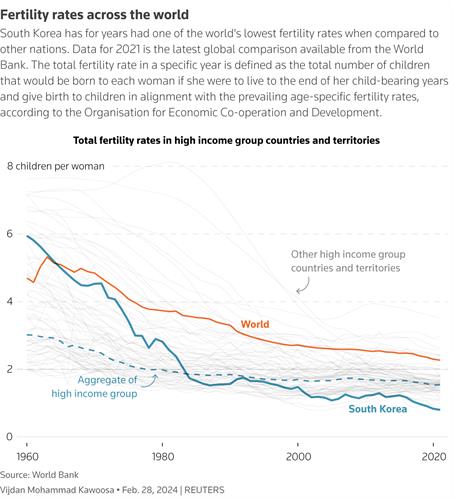The world's lowest fertility rate in South Korea will plunge again in 2023.
South Korea's fertility rate hits record low of 0.72 in 2023, as women delay childbirth due to career and financial concerns.
SEOUL, Feb 28 - South Korea's already world-low fertility rate continued its steep decline in 2023. Women, worried about career advancement and the high cost of raising children, opted to delay childbirth or remain childless. Statistics Korea reported on Wednesday that the average number of expected babies for a South Korean woman during her reproductive life dropped to a record low of 0.72 from 0.78 in 2022.
This rate is significantly below the 2.1 needed for a stable population and far behind the 1.24 rate in 2015 when concerns about housing and education costs were lower. Since 2018, South Korea has been the only OECD member with a rate below 1, despite the country's substantial efforts to reverse the trend. The population declined for the fourth consecutive year in 2023.
South Korea also has the worst gender pay gap in the OECD, with Korean women earning about two-thirds of men's income. Jung Jae-hoon, a professor at Seoul Women's University, noted, "Women often can't advance in the workplace because they are usually the primary caregiver and often have to return to work after extended leaves."
 Related Image: © Reuters
Related Image: © Reuters
Gwak Tae-hee, 34, a junior manager at a Korean dairy product maker, expressed her concerns, saying, "Having a baby is on my list, but there are windows for promotions and I don't want to be passed over." Gwak had considered starting in vitro fertilization (IVF) treatment last year but chose to focus on work projects instead to improve her career prospects.
South Korea's demographic crisis has emerged as the top risk to economic growth and the social welfare system, with the country's population of 51 million projected to halve by the end of this century. South Korea has forecasted its fertility rate to further decline to 0.68 in 2024. The capital Seoul, with the country's highest housing costs, had the lowest fertility rate of 0.55 last year.
Ahead of elections in April, major political parties in South Korea have promised more public housing and easier loans to encourage childbirth, aiming to address fears of "national extinction" as fertility rates decline. While being married is seen as a prerequisite to having children in South Korea, marriages are also decreasing in the country.
"There are people who don't get married, but we think about why married couples choose not to have babies, and my understanding is that addressing that part is going to be the focus of our policies," an official at Statistics Korea said, without elaborating.
The focus on population in the parties' election platforms reflects growing alarm, as more than 360 trillion won ($270 billion) has been spent on areas such as childcare subsidies since 2006 without reversing the record low fertility rates. South Korea is not alone in the region in struggling with a rapidly ageing population. Neighbouring Japan reported on Tuesday that the number of babies born in 2023 fell for the eighth consecutive year to a new record low. Japan's fertility rate hit a record low of 1.26 in 2022, while China recorded 1.09, also a record low.